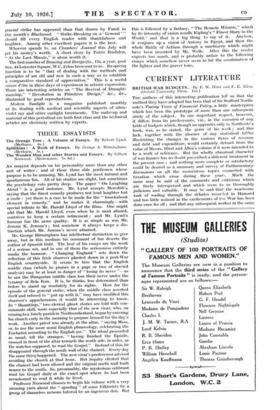THREE ESSAYISTS
The Orange Tree : A Volume of Essays. By Robert Lynd. (Methuen. 68.) Spinikins : A Book of Essays. By George A. Birmingham. (Methuen. 5s.) The Wooden Man and other Stories and Essays. By Gilbert Norwood. (Heinemann. 7s. 6d.)
AN essayist depends on his personality more than any other sort of writer ; and of these three able gentlemen whose
purpose is to be amusing, Mr. Lynd has the most natural and spontaneous fun. All of his studies are slight, but sometimes the psychology cuts pretty deep. The paper "On Laughing Aloud" is a good instance. Mr. Lynd accepts Meredith's saying that the finest comedy produces not loud laughter but a smile : yet there is a case to be made for the "knockabout element in comedy," and he makes it charmingly—with special tribute to Mr. Harold Lloyd of the films. One might add that Mr. Harold Lloyd, even when he is most absurd, contrives to keep a certain refinement ; and Mr. Ljmd's humour has the same quality. It is as simple as was Mr.
Jerome K. Jerome's ; but somehow it always keeps a dis- tinction which Mr. Jerome's never attained.
Mr. George Birmingham has intellectual distinction to give away, but in this medium his command of fun deserts the author of Spanish Gold. The best of his essays are the work of a serious wit, and in one of them the seriousness entirely masks the humour. "Changing England" sets down the reflection of this Irish observer planted down in a post-War English countryside. It seems to him that the English middle class (which he praises in a page or two of shrewd analysis) may be at least in danger of " losing its nerve "—as he saw the Hungarian middle class lose their nerve under the tyranny of Bela Kun. It is, he thinks, less determined than before to stand up resolutely for its rights. How far the episode of the general strike, when the middle class asserted itself and refused to "put up with it," may have modified this observer's apprehensions it would be interesting to know.
In " Hauntings," two clerical ghost stories are told with con- summate skill, more especially that of the new vicar, who, on coming to a lonely parish in Northumberland, began by entering his church early in the morning to prepare himself for the days work. Another priest was already at the altar, "saying Mass, or, to use the more usual English phraseology, celebrating the Eucharist according to the English use." The ritual proceeded as usual, till the stranger, "having finished the Epistle, crossed in front of the altar towards the north side, in order, as
the watcher supposed, to read the Gospel." Instead of this, he disappeared through the north wall of the chancel. Every day the same thing happened. The new-vicar's predecessor advised avoiding the church at that hour. But inquiry elicited that the chancel had been altered and the original north wall built
nearer to the south. So, presumably, the Mysterious celibrant read his Gospel daily at the exact spot where he had been accustomed to read it while he lived.
Professor Norwood chooses to begin his volume with a very amusing yarn about the " spoofing " of some folklorists by a group of shameless nersons tutored by an ingenious don. But this is followed by a fantasy, "The Remote Witness," which by its intensity of vision recalls Kipling's "Finest Story in the World," and that is a big thing to say of it. Anyhow, it conjures up a vision of Antony in Egypt, and then the. whole Battle of Actium through a machinery which might have been invented by Mr. Wells. After this the reader. expects too much, and is probably unfair to the following essays which somehow never seem to hit the combination of the lighter and the graver tone.










































 Previous page
Previous page